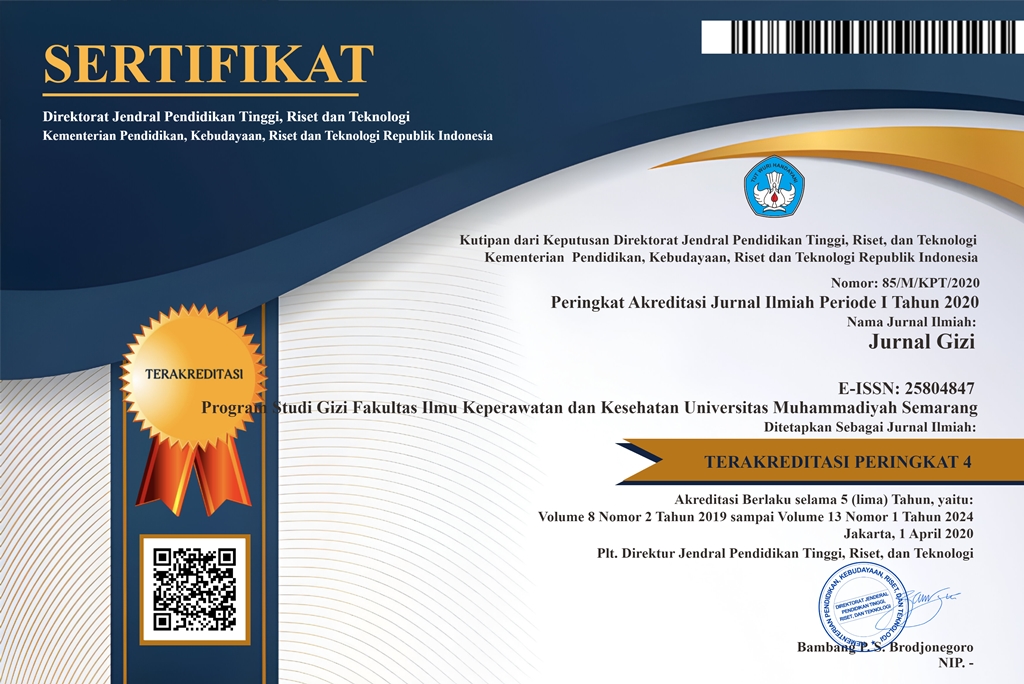Indeks Massa Tubuh Menurut Umur sebagai Indikator Persen Lemak Tubuh pada Remaja
(1)
(2)
(*) Corresponding Author
Abstract
Health impact which caused by overnutrition is related by excess body fat. Thus, nutritional
status monitoring in adolescent is crucial because the prevelance of overnutrition in adolescent
increased per years. Body Mass Index per age (BMI/A) is generally used to determine nutritional
status, but incapable to measure overnutrition related excess body fat precisely. Body fat percentage
is used to determine overnutrition but special equipment and capability are required. The purpose
of the study is to analyze correlation between BMI/A and body fat percentage and verify BMI/A’s
sensitivity-specificity as body fat percentage’s indicator. In this cross-sectional study, 82 adolescents
from SMAN 47 Jakarta are chosen to participate by simple random sampling. Body fat percentage
and BMI/A are being taken by anthropometric instruments, where body fat percentage used to be
the gold standart. Using BMI/A, the prevalence of overnutrition is 23,2%. Its lower than using the
gold standart (35,4%). The correlation between BMI/A and percent body fat is r=0,814; p=0,000.
Their sensitivity is 55,17% while their spesificity is 94,34%. Eventhough there is strong correlation,
BMI/A is less sensitive as body fat percentage’s indicator to determine nutritional status in
adolescent. Body fat measurement is needed to validate value of BMI/A.
Key words: adolescent, BMI/A, body fat percentage
status monitoring in adolescent is crucial because the prevelance of overnutrition in adolescent
increased per years. Body Mass Index per age (BMI/A) is generally used to determine nutritional
status, but incapable to measure overnutrition related excess body fat precisely. Body fat percentage
is used to determine overnutrition but special equipment and capability are required. The purpose
of the study is to analyze correlation between BMI/A and body fat percentage and verify BMI/A’s
sensitivity-specificity as body fat percentage’s indicator. In this cross-sectional study, 82 adolescents
from SMAN 47 Jakarta are chosen to participate by simple random sampling. Body fat percentage
and BMI/A are being taken by anthropometric instruments, where body fat percentage used to be
the gold standart. Using BMI/A, the prevalence of overnutrition is 23,2%. Its lower than using the
gold standart (35,4%). The correlation between BMI/A and percent body fat is r=0,814; p=0,000.
Their sensitivity is 55,17% while their spesificity is 94,34%. Eventhough there is strong correlation,
BMI/A is less sensitive as body fat percentage’s indicator to determine nutritional status in
adolescent. Body fat measurement is needed to validate value of BMI/A.
Key words: adolescent, BMI/A, body fat percentage
Full Text:
PDFArticle Metrics
Abstract view : 1738 timesPDF - 4647 times
DOI: https://doi.org/10.26714/jg.7.2.2018.%25p
Refbacks
- There are currently no refbacks.
Diterbitkan oleh: Program Studi Gizi (D3 dan S1)
Fakultas Ilmu Keperawatan dan Kesehatan
Universitas Muhammadiyah Semarang
Sekretariat: Jl. Kedungmundu Raya No. 18 Semarang
Contact Person : Hapsari Sulistya Kusuma, S.Gz, M.Si (+62 85 6 41 536 553)

This work is licensed under a Creative Commons Attribution 4.0 International License.










.png)
.png)
_.png)